7 Advanced AI Tools That Are Transforming Modern Research
Are you finding it challenging to navigate the overwhelming volume of academic literature and research data? You're not alone. Fortunately, as the research landscape continues to evolve at a rapid pace, we now have access to sophisticated AI-powered tools that can help manage this complexity. In this article, we'll explore five innovative platforms—Extracto, Elicit, Semantic Scholar, Connected Papers, and Scholarcy—that are transforming how researchers approach their work. These tools offer practical solutions for every phase of the research process, from initial literature searches to deep analysis and comprehension. By leveraging these resources effectively, researchers can enhance their productivity and accelerate their path to meaningful discoveries.
Extracto
Web scraping tool that simplifies data collection in research
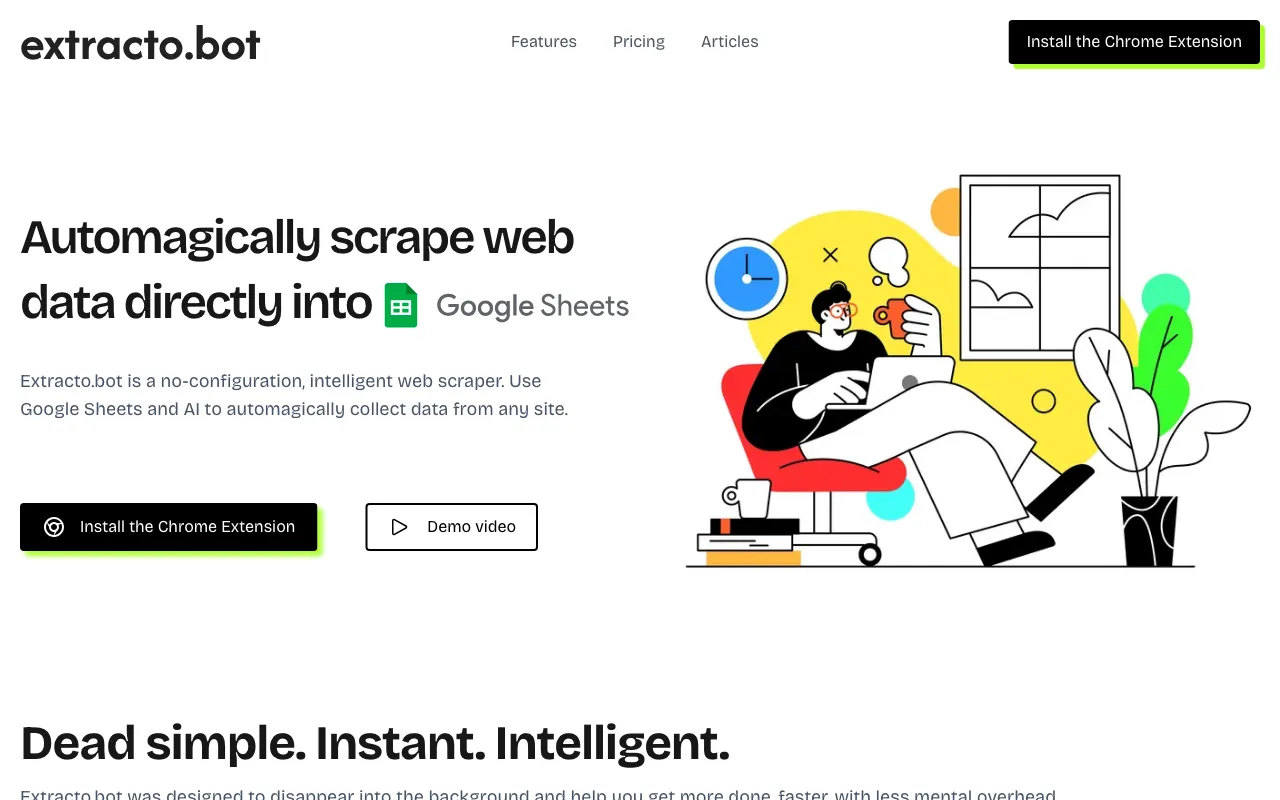
Extracto.bot is a web scraping tool that connects with Google Sheets to help researchers gather data more easily. Users don't need to deal with complex setups - they just add their target fields as columns in a spreadsheet go to the website and click "extract." This means researchers can spend less time gathering data and more time analyzing it.
The tool works right inside Google Drive which is great because most people already know how to use spreadsheets and can easily share and organize their research data. It's pretty smart about saving time and can pull information from lots of different kinds of websites which makes it useful for various research projects.
You can use it for all sorts of things like getting sales data from LinkedIn and company websites comparing prices across stores or even collecting information for big projects like buying a house. The nice thing is researchers can grab exactly the data they need without dealing with website restrictions which really helps streamline their work.
There are different pricing options including a free starter plan so researchers with any budget can try it out. One of the handiest features is that you just press CMD+SHIFT+E to start extracting data right into your Google Sheet where you can analyze and share it immediately. This makes the whole process of collecting data for research much more straightforward and efficient.
Link: https://www.extracto.bot
Elicit
AI research assistant that rapidly finds and analyzes papers.
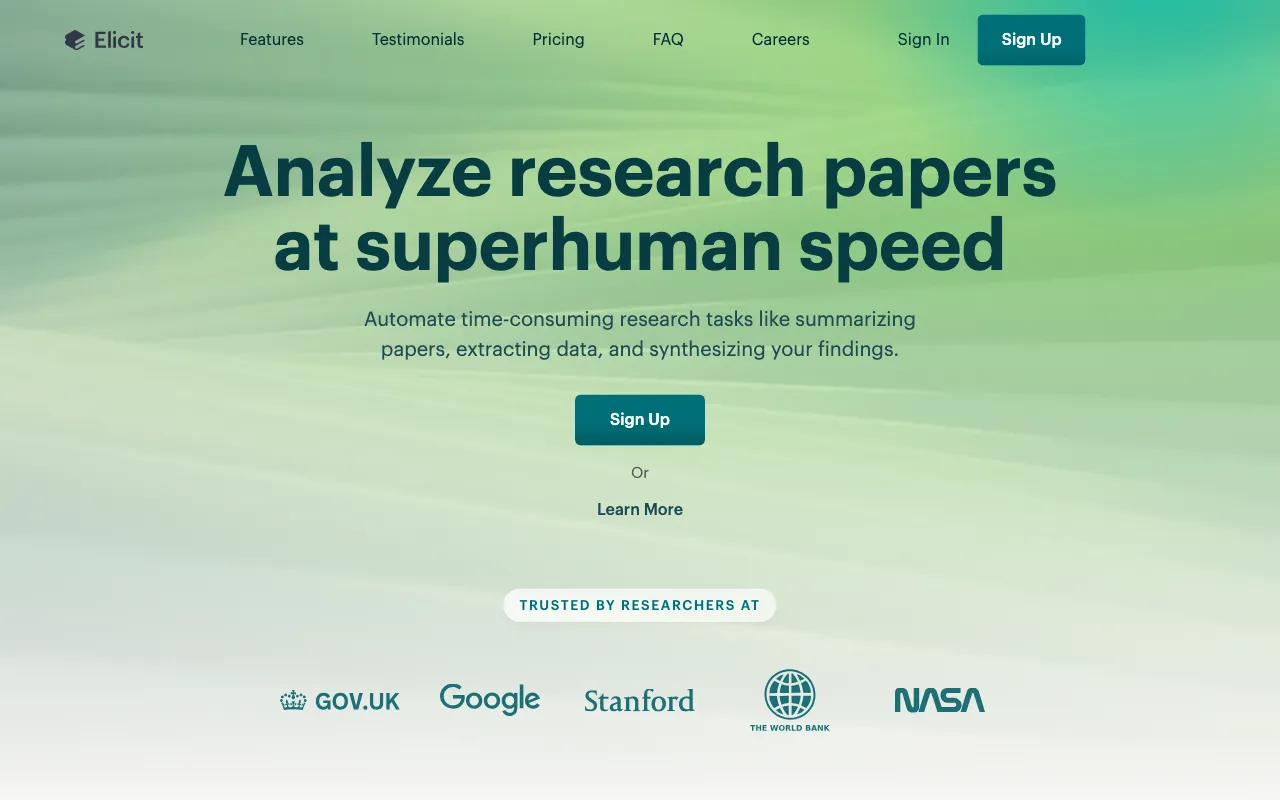
Elicit works as an AI research assistant that helps speed up academic research by handling the repetitive stuff. It lets you look through about 125 million academic papers using regular language queries and gives you quick one-sentence summaries plus suggestions for related research. The tool is really good at pulling together findings from multiple papers by spotting common themes and ideas which helps researchers quickly answer questions like "What effects does this drug have?" or "Which datasets have other researchers used?". You can also upload your own PDFs for the system to analyze with features that include quick summaries answering specific questions and putting data into organized tables. This makes it easier to get oriented in a research area and helps streamline data collection for systematic reviews.
The platform comes with lots of features focused on making research more efficient and researchers seem pretty happy with how well it works. Elicit has different subscription options ranging from a free basic plan for casual use to bigger enterprise packages for teams and institutions. They're honest about how language models are still developing and focus on being accurate by training models for specific tasks basing answers on real academic papers and making it easy to check sources. With over 2 million researchers using it Elicit helps save a lot of research time so people can focus more on analyzing and interpreting results. As researcher Michael Nielsen PhD points out "It's rapidly surfaced a lot of interesting things I hadn't found through traditional search engines" which shows how Elicit might help discover new connections and speed up research work.
Link: https://elicit.org/
semanticscholar
AI-powered research tool for efficient paper discovery
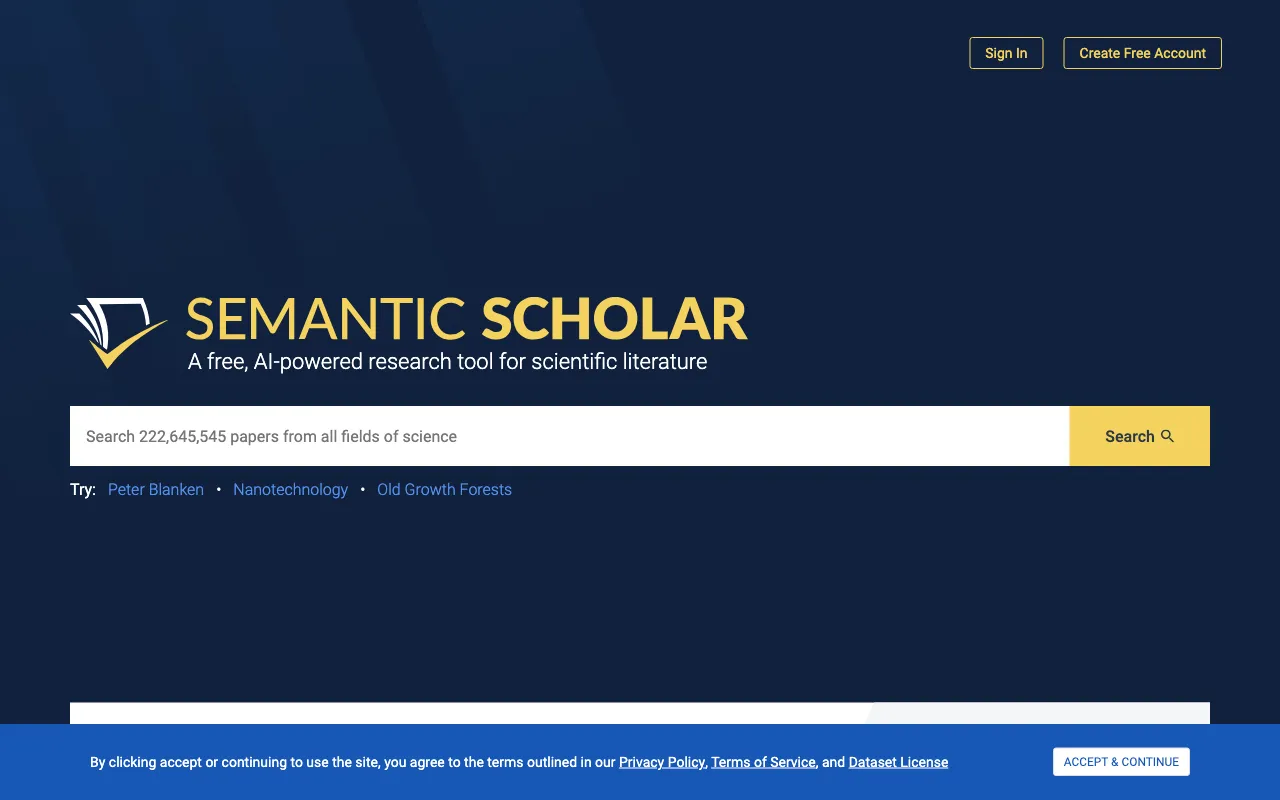
Semantic Scholar helps people explore over 222 million scientific papers through their free AI research platform. It makes finding and reading research papers much easier and more efficient. The platform includes a powerful search engine and a new API which developers can use to build better research tools. Their innovative Semantic Reader which is still in beta testing helps add helpful context to papers and makes them easier to understand.
The platform gives researchers several important advantages. You can search through a huge database of papers to find exactly what you need and the smart search helps you locate relevant research quickly. The Semantic Reader is especially useful because it makes complex scientific papers more understandable by adding extra context and explanations. According to research by Schwartz and others in 2020, making AI research more efficient helps reduce environmental impact and lets more people access important scientific work. This is exactly what Semantic Scholar does - it provides free access to powerful AI tools that help researchers work more effectively.
Link: https://www.semanticscholar.org/
connectedpapers
Visualize research papers and their connections effortlessly
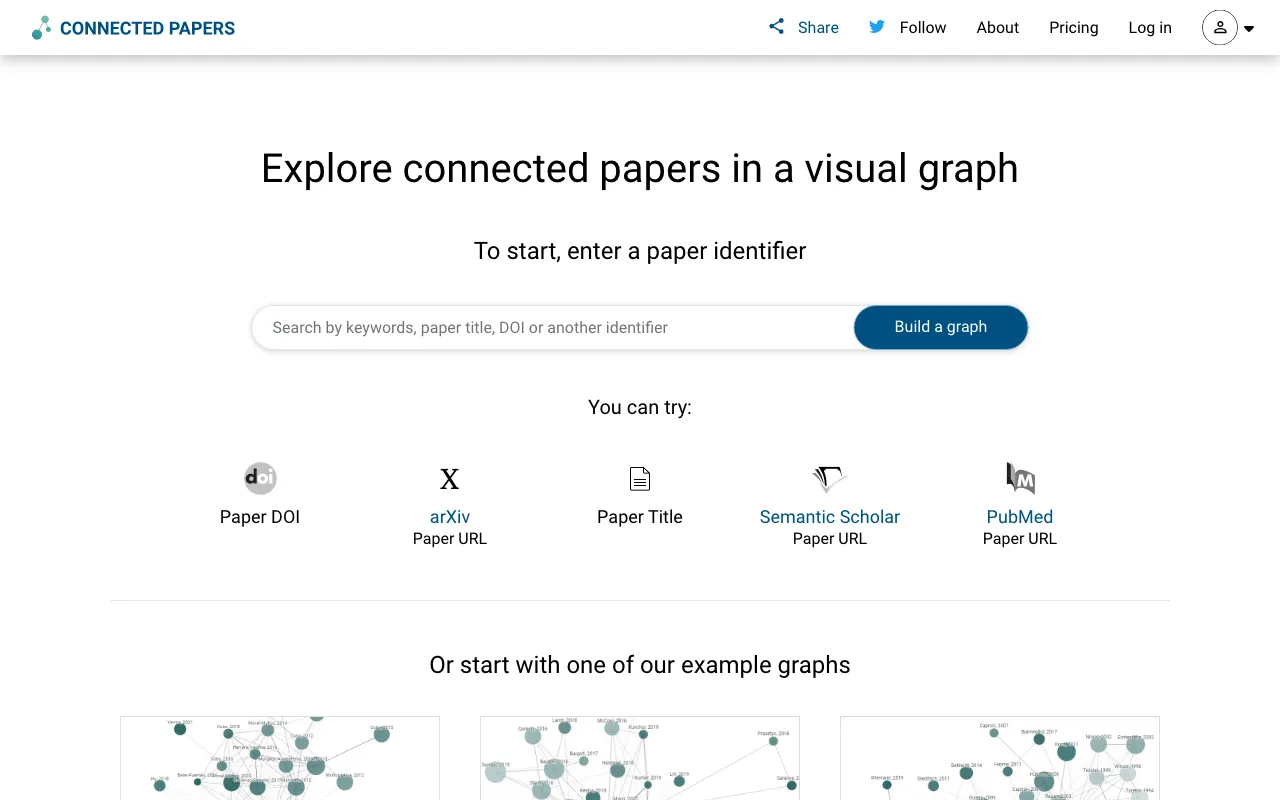
Connected Papers helps researchers explore and understand academic fields through a neat visual interface. When you input a paper's info like its DOI or title, it creates an interactive map showing how different publications connect to each other. This makes it super useful for getting a quick grasp of research areas and seeing what papers are important in the field.
The tool is especially helpful when you're starting research in a new area or need to do thorough literature reviews. It shows you connections between papers that might not be obvious at first and helps identify both influential earlier work and newer developments. By using Connected Papers researchers can easily keep track of new publications in fast-moving fields and build better bibliographies.
The platform pulls data from Semantic Scholar which means it covers tons of different fields from computer science to humanities. It lets you look at research from two main angles - Prior Works shows you the foundation papers while Derivative Works reveals newer research that built on the original paper. This makes it practical for almost any kind of academic research where understanding paper relationships is important.
Link: https://www.connectedpapers.com/
Scholarcy
Transform complex research papers into digestible flashcard summaries
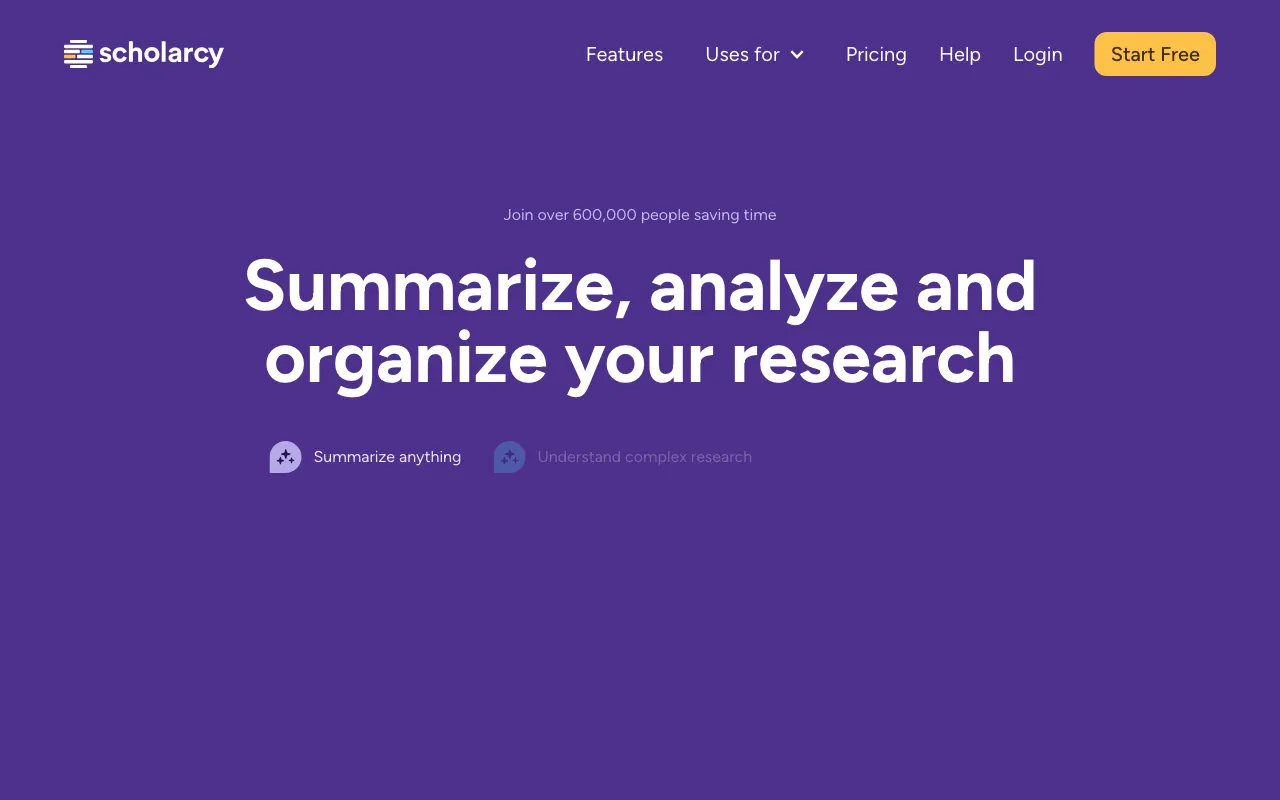
Scholarcy is an AI research tool that helps students and researchers work more efficiently with their study materials. It's especially useful for anyone from undergrad to postgrad level who needs to handle lots of academic content. The tool tackles a common problem: dealing with large amounts of research materials by offering features that summarize analyze and organize academic texts including articles, book chapters and even video content.
When you feed documents into Scholarcy, it turns them into interactive summary flashcards that highlight the important stuff and help you quickly understand main ideas. The tool is pretty flexible with its summarization options letting you adjust things to match how you like to read - you can get anything from quick one-sentence summaries to detailed researcher-level breakdowns. It uses smart highlighting and analysis features which makes it easier to critically evaluate and understand complex papers. Like they say on their website Scholarcy helps bring order to chaos by giving you a structured way to read through lots of articles.
But it's not just about summarizing stuff. Scholarcy also helps you organize and connect different pieces of knowledge together. You can save all your summaries and flashcards in your personal library keep track of references figures and tables and quickly review key findings whenever you need to. The platform works well with other research tools too - you can export summaries and bibliographies in different formats and it connects directly with Zotero. This means you can easily fit Scholarcy into whatever research workflow you already have. With all these features designed to help you understand organize and use research material better, Scholarcy aims to make the whole research process simpler and helps you actually put what you learn to use as you work on your big writing projects.